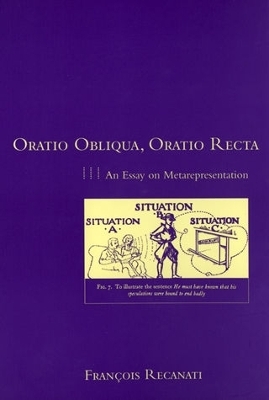
Oratio Obliqua, Oratio Recta
An Essay on Metarepresentation
Seiten
2000
MIT Press (Verlag)
9780262181990 (ISBN)
MIT Press (Verlag)
9780262181990 (ISBN)
- Keine Verlagsinformationen verfügbar
- Artikel merken
Mental and linguistic representations can be represented themselves, meaning that we can think and talk about speech and thought. This book discusses the structure of this phenomenon, known as metarepresentation, from a variety of perspectives.
Among the entities that can be mentally or linguistically represented are mental and linguistic representations themselves. That is, we can think and talk about speech and thought. This phenomenon is known as metarepresentation. An example is "Authors believe that people read books."
In this book Francois Recanati discusses the structure of metarepresentation from a variety of perspectives. According to him, metarepresentations have a dual structure: their content includes the content of the object-representation (people reading books) as well as the "meta" part (the authors' belief). Rejecting the view that the object representation is mentioned rather than used, Recanati claims that since metarepresentations carry the content of the object representation, they must be about whatever the object representation is about. Metarepresentations are fundamentally transparent because they work by simulating the representation they are about.
Topics covered in this wide-ranging work include the analysis of belief reports and talk about fiction, world shifting, opacity and substitutivity, quotation, the relation between direct and indirect discourse, context shifting, semantic pretense, and deference in language and thought.
Among the entities that can be mentally or linguistically represented are mental and linguistic representations themselves. That is, we can think and talk about speech and thought. This phenomenon is known as metarepresentation. An example is "Authors believe that people read books."
In this book Francois Recanati discusses the structure of metarepresentation from a variety of perspectives. According to him, metarepresentations have a dual structure: their content includes the content of the object-representation (people reading books) as well as the "meta" part (the authors' belief). Rejecting the view that the object representation is mentioned rather than used, Recanati claims that since metarepresentations carry the content of the object representation, they must be about whatever the object representation is about. Metarepresentations are fundamentally transparent because they work by simulating the representation they are about.
Topics covered in this wide-ranging work include the analysis of belief reports and talk about fiction, world shifting, opacity and substitutivity, quotation, the relation between direct and indirect discourse, context shifting, semantic pretense, and deference in language and thought.
| Reihe/Serie | Representation and Mind series |
|---|---|
| Verlagsort | Cambridge, Mass. |
| Sprache | englisch |
| Themenwelt | Geisteswissenschaften ► Philosophie ► Sprachphilosophie |
| Geisteswissenschaften ► Sprach- / Literaturwissenschaft ► Sprachwissenschaft | |
| ISBN-13 | 9780262181990 / 9780262181990 |
| Zustand | Neuware |
| Informationen gemäß Produktsicherheitsverordnung (GPSR) | |
| Haben Sie eine Frage zum Produkt? |
Mehr entdecken
aus dem Bereich
aus dem Bereich
Eine Philosophie der künstlichen Intelligenz
Buch | Softcover (2025)
C.H.Beck (Verlag)
CHF 34,90
Unser schöner neuer Sprachgebrauch
Buch | Hardcover (2025)
zu Klampen Verlag
CHF 27,90


